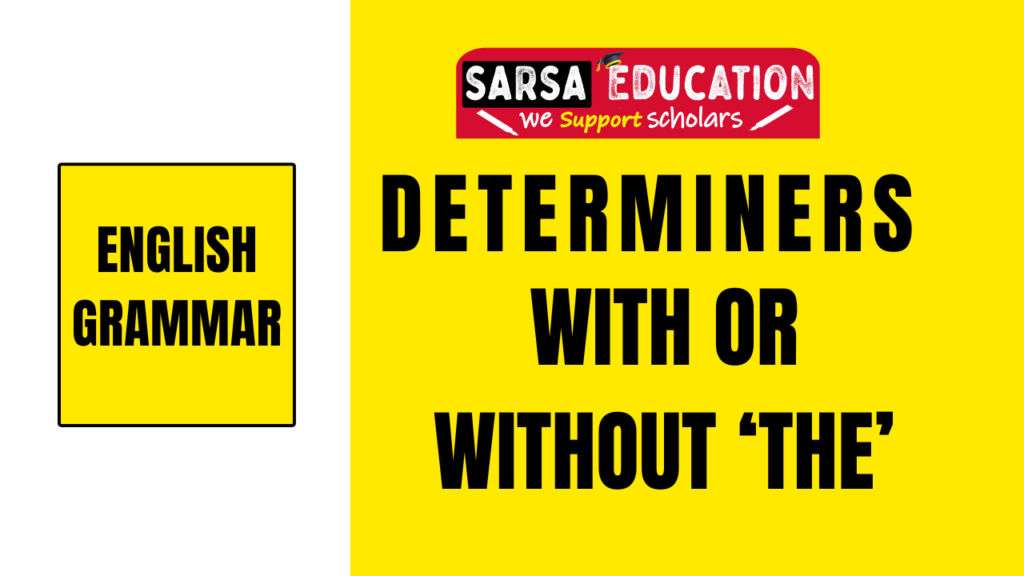Contents
- Use of Determiners
- (With / Without ‘The’)
- 1. Articles
- 2. Demonstratives
- 3. Possessives
- 4. Quantifiers (express quantity)
- 5. Numbers (express exact quantity)
- 6. Distributives (refer to individuals in a group)
- 7. Interrogative Determiners (used in questions)
- 8. Possessive’s (shows possession)
- Determiners that can be used with ‘the’
- Determiners that do not work with ‘the’
- Determiners that change meaning with ‘the’
Use of Determiners
(With / Without ‘The’)
Determiners are words that introduce nouns and provide them context, like possession, quantity, definiteness, or specificity. Determiners come in the following primary types:
1. Articles
- There are two types of articles:
- Definite article: the (e.g. the pen)
- Indefinite articles: a, an (e.g. a bird, an atlas)
- Note: We use ‘an’ before words which begin with a vowel (a, e, i, o, u).
- We use ‘a’ before words that begin with a consonant (b, c, d, f, g, h, j, k, l, m, n, p, q, r, s, t, v, w, x, y, z).
2. Demonstratives
- We use this (singular), these (plural) to point people, things and animals near us.
- We use that (singular) those (plural) to point to people things or animal far away from us.
- This, that, these, those. (e.g. this book, those chairs)
3. Possessives
- That something belongs to somebody. This is my book.
- My, your, his, her, its, our, their. (e.g. my pencil, their house)
4. Quantifiers (express quantity)
- We use some in affirmative sentence with plural countable nouns and with uncountable nouns. I need some biscuits and some sugar for my tea.
- Some, any, much, many, a lot of, few, little, several, all, both, each, every.
- (e.g. many cats, few options, all boys)
5. Numbers (express exact quantity)
- Cardinal numbers: one, two, three etc. (e.g. two dogs)
- Ordinal numbers: first, second, third etc. (e.g. the first summer vacation)
6. Distributives (refer to individuals in a group)
- Each, every, either, neither (e.g. each pupil, neither option)
7. Interrogative Determiners (used in questions)
- What, which, whose (e.g. which colour do you like?)
8. Possessive’s (shows possession)
- This is actually Rita’book
- In general, the possessive case is used for people In order to talk about things, we use the preposition of Mary’s mother, the legs of the table.
Use of Determiners
Determiners that can be used with ‘the’
These determiners work with ‘the’ when referring to specific things.
- Possessives (but not together)
The my pen (incorrect)
My pen OR The pen (correct) - Quantifiers (Some Cases)
The many problems we face today__
The few students who attended__ - Numbers (when specifying a known group)
The first vacation
The three candidates who got___
Use of Determiners
- Distributives (Some Cases)
The each answer was unique(incorrect)
Each of the answers was unique (correct) - Superlatives and Ordinals (which usually require ‘the’)
The best solution
The second attempt
Use of Determiners
Determiners that do not work with ‘the’
These determiners usually stand alone and do not take ‘the’
- Demonstratives (this, that, these, those)
The this book (incorrect)
This book OR The book (correct) - Possessives (my, your, his, her, its, our, their)
The my car (incorrect)
My car OR The car(correct) - Interrogatives (which, what, whose)
The which dress do you like? (incorrect)
Which dress do you like? (correct) - Some Quantifiers (some, any, much, most, all, enough)
The some people(incorrect)
Some people(correct)
Use of Determiners
Determiners that change meaning with ‘the’
Some determiners change meaning when used with or without ‘the’
- ‘Few’ vs. ‘The few’
Few people attended. (hardly any)
The few people who attended (specific small group) - ‘Most’ vs. ‘The most’
Most students like English. (general)
The most important lesson (specific) - ‘All’ vs. ‘All the’
All students must take the test. (general)
All the students in this class (specific group)
Use of Determiners
Read also: 200 Idioms in English
For regular English-Speaking Course updates, kindly join our Telegram channel
Follow the Sarsa Education channel on Telegram: https://shorturl.at/R5WKa

